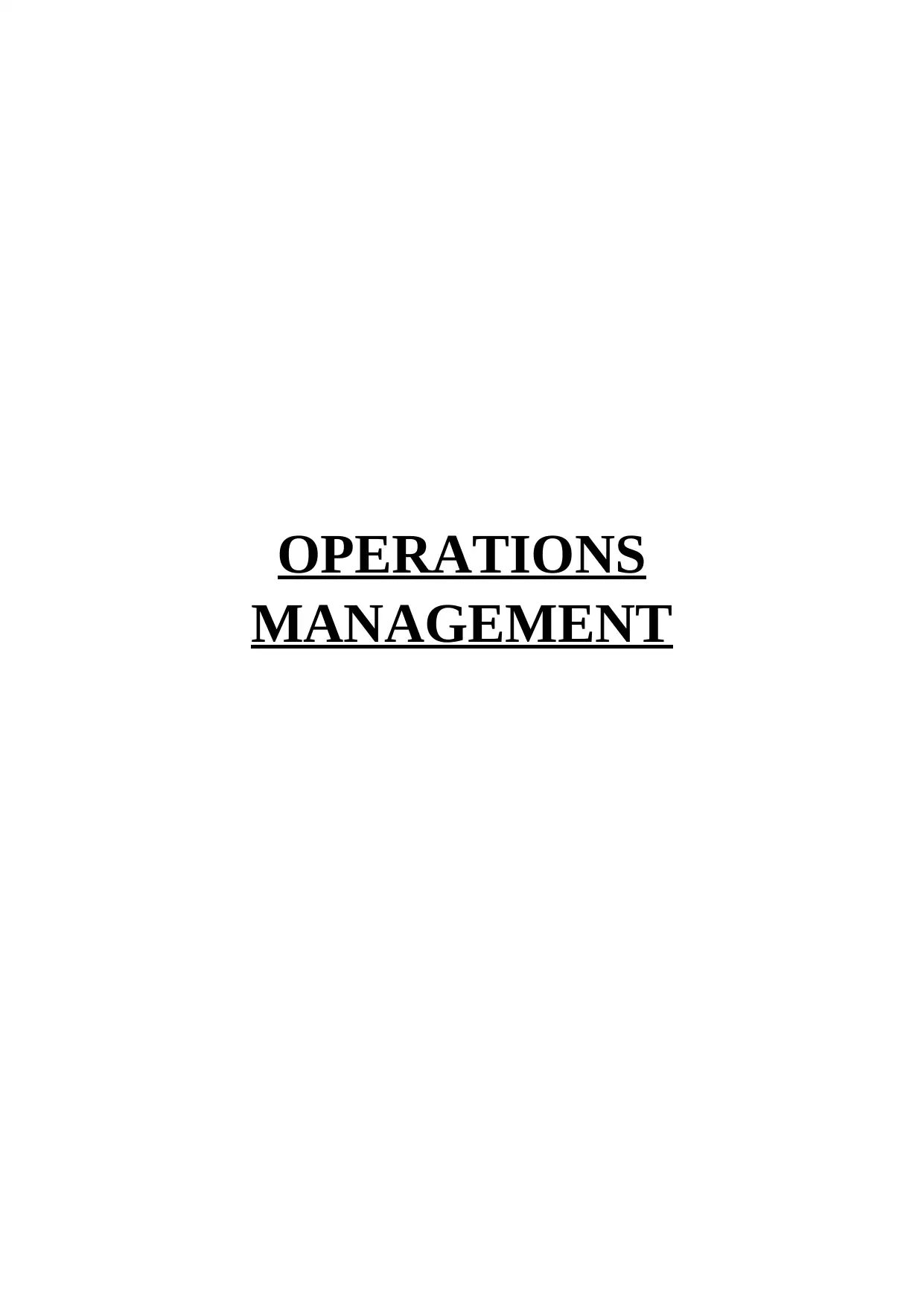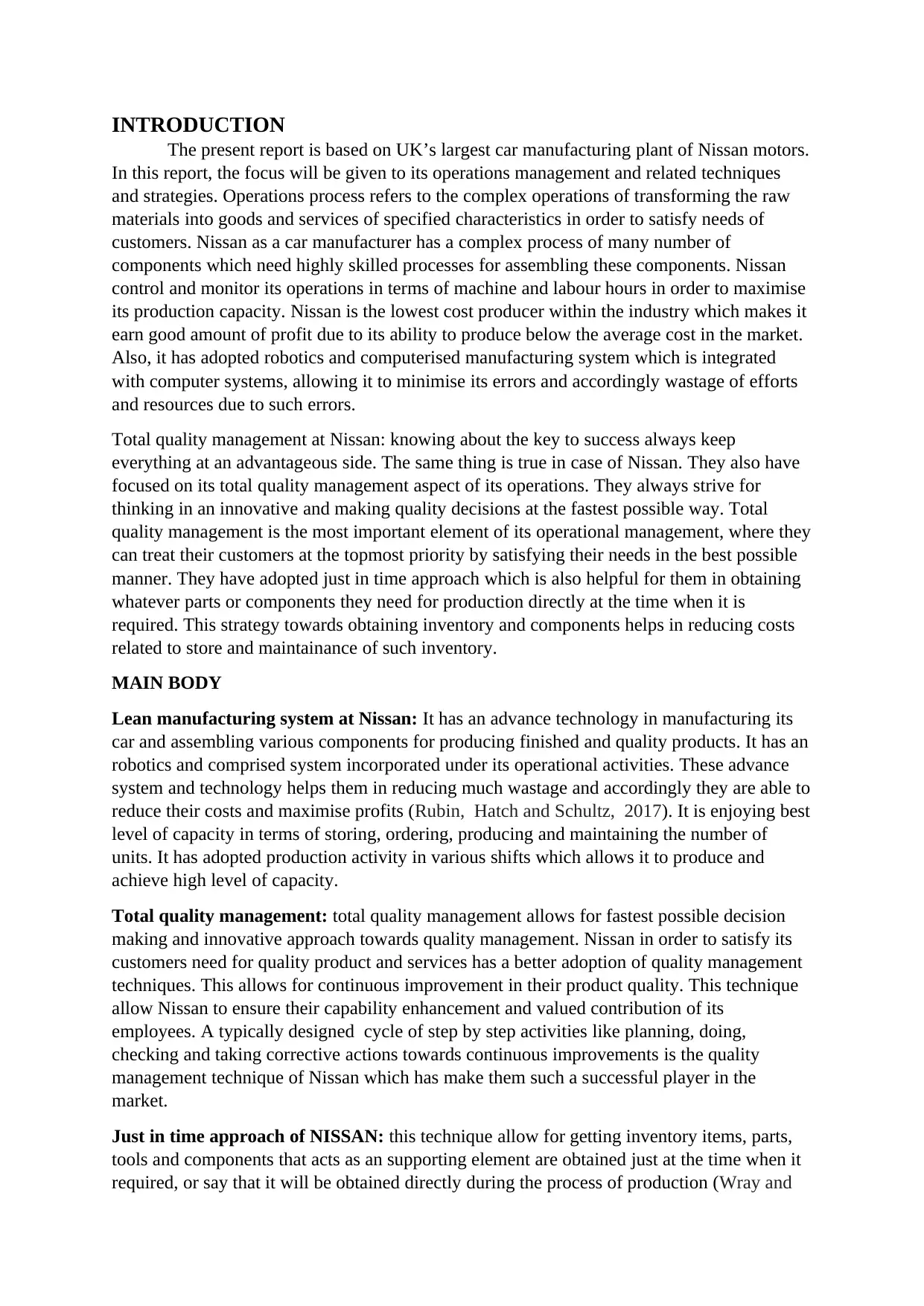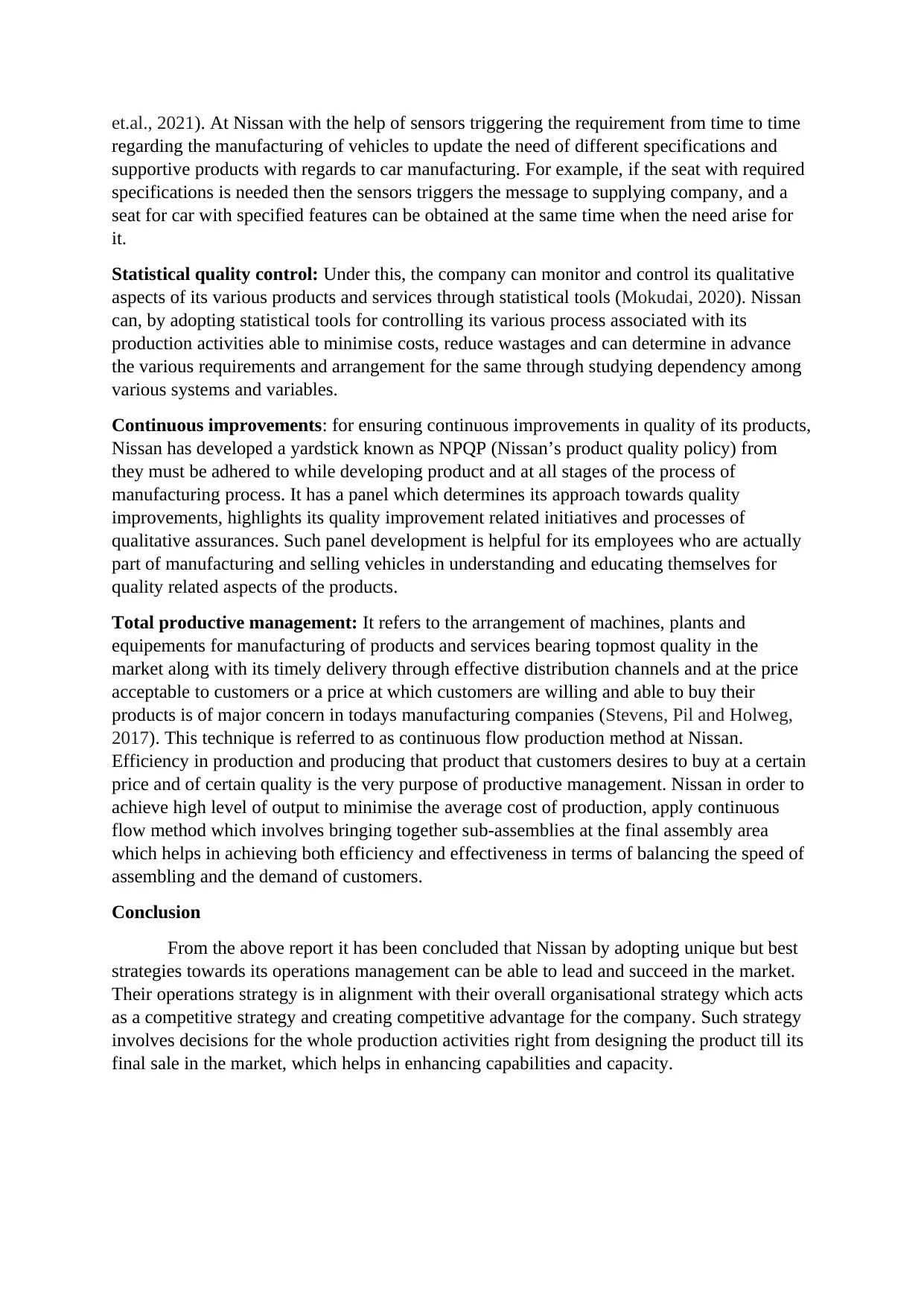Operations Management Report: Nissan Motor Manufacturing Plant
VerifiedAdded on 2022/12/28
|5
|1235
|79
Report
AI Summary
This report provides an in-depth analysis of Nissan's operations management, focusing on its strategies and techniques to achieve efficiency and success. The report examines key elements such as lean manufacturing, which helps reduce waste and maximize profits through robotics and computerized systems. It also discusses total quality management, emphasizing customer satisfaction and continuous improvement through innovative decision-making and a just-in-time approach. The report further explores statistical quality control, continuous improvement initiatives, and total productive management, including the use of NPQP and continuous flow production methods. The conclusion highlights how Nissan's operations strategy aligns with its overall organizational strategy to create a competitive advantage in the market. The report references key academic sources to support its analysis.

OPERATIONS
MANAGEMENT
MANAGEMENT
Paraphrase This Document
Need a fresh take? Get an instant paraphrase of this document with our AI Paraphraser


INTRODUCTION
The present report is based on UK’s largest car manufacturing plant of Nissan motors.
In this report, the focus will be given to its operations management and related techniques
and strategies. Operations process refers to the complex operations of transforming the raw
materials into goods and services of specified characteristics in order to satisfy needs of
customers. Nissan as a car manufacturer has a complex process of many number of
components which need highly skilled processes for assembling these components. Nissan
control and monitor its operations in terms of machine and labour hours in order to maximise
its production capacity. Nissan is the lowest cost producer within the industry which makes it
earn good amount of profit due to its ability to produce below the average cost in the market.
Also, it has adopted robotics and computerised manufacturing system which is integrated
with computer systems, allowing it to minimise its errors and accordingly wastage of efforts
and resources due to such errors.
Total quality management at Nissan: knowing about the key to success always keep
everything at an advantageous side. The same thing is true in case of Nissan. They also have
focused on its total quality management aspect of its operations. They always strive for
thinking in an innovative and making quality decisions at the fastest possible way. Total
quality management is the most important element of its operational management, where they
can treat their customers at the topmost priority by satisfying their needs in the best possible
manner. They have adopted just in time approach which is also helpful for them in obtaining
whatever parts or components they need for production directly at the time when it is
required. This strategy towards obtaining inventory and components helps in reducing costs
related to store and maintainance of such inventory.
MAIN BODY
Lean manufacturing system at Nissan: It has an advance technology in manufacturing its
car and assembling various components for producing finished and quality products. It has an
robotics and comprised system incorporated under its operational activities. These advance
system and technology helps them in reducing much wastage and accordingly they are able to
reduce their costs and maximise profits (Rubin, Hatch and Schultz, 2017). It is enjoying best
level of capacity in terms of storing, ordering, producing and maintaining the number of
units. It has adopted production activity in various shifts which allows it to produce and
achieve high level of capacity.
Total quality management: total quality management allows for fastest possible decision
making and innovative approach towards quality management. Nissan in order to satisfy its
customers need for quality product and services has a better adoption of quality management
techniques. This allows for continuous improvement in their product quality. This technique
allow Nissan to ensure their capability enhancement and valued contribution of its
employees. A typically designed cycle of step by step activities like planning, doing,
checking and taking corrective actions towards continuous improvements is the quality
management technique of Nissan which has make them such a successful player in the
market.
Just in time approach of NISSAN: this technique allow for getting inventory items, parts,
tools and components that acts as an supporting element are obtained just at the time when it
required, or say that it will be obtained directly during the process of production (Wray and
The present report is based on UK’s largest car manufacturing plant of Nissan motors.
In this report, the focus will be given to its operations management and related techniques
and strategies. Operations process refers to the complex operations of transforming the raw
materials into goods and services of specified characteristics in order to satisfy needs of
customers. Nissan as a car manufacturer has a complex process of many number of
components which need highly skilled processes for assembling these components. Nissan
control and monitor its operations in terms of machine and labour hours in order to maximise
its production capacity. Nissan is the lowest cost producer within the industry which makes it
earn good amount of profit due to its ability to produce below the average cost in the market.
Also, it has adopted robotics and computerised manufacturing system which is integrated
with computer systems, allowing it to minimise its errors and accordingly wastage of efforts
and resources due to such errors.
Total quality management at Nissan: knowing about the key to success always keep
everything at an advantageous side. The same thing is true in case of Nissan. They also have
focused on its total quality management aspect of its operations. They always strive for
thinking in an innovative and making quality decisions at the fastest possible way. Total
quality management is the most important element of its operational management, where they
can treat their customers at the topmost priority by satisfying their needs in the best possible
manner. They have adopted just in time approach which is also helpful for them in obtaining
whatever parts or components they need for production directly at the time when it is
required. This strategy towards obtaining inventory and components helps in reducing costs
related to store and maintainance of such inventory.
MAIN BODY
Lean manufacturing system at Nissan: It has an advance technology in manufacturing its
car and assembling various components for producing finished and quality products. It has an
robotics and comprised system incorporated under its operational activities. These advance
system and technology helps them in reducing much wastage and accordingly they are able to
reduce their costs and maximise profits (Rubin, Hatch and Schultz, 2017). It is enjoying best
level of capacity in terms of storing, ordering, producing and maintaining the number of
units. It has adopted production activity in various shifts which allows it to produce and
achieve high level of capacity.
Total quality management: total quality management allows for fastest possible decision
making and innovative approach towards quality management. Nissan in order to satisfy its
customers need for quality product and services has a better adoption of quality management
techniques. This allows for continuous improvement in their product quality. This technique
allow Nissan to ensure their capability enhancement and valued contribution of its
employees. A typically designed cycle of step by step activities like planning, doing,
checking and taking corrective actions towards continuous improvements is the quality
management technique of Nissan which has make them such a successful player in the
market.
Just in time approach of NISSAN: this technique allow for getting inventory items, parts,
tools and components that acts as an supporting element are obtained just at the time when it
required, or say that it will be obtained directly during the process of production (Wray and
⊘ This is a preview!⊘
Do you want full access?
Subscribe today to unlock all pages.

Trusted by 1+ million students worldwide

et.al., 2021). At Nissan with the help of sensors triggering the requirement from time to time
regarding the manufacturing of vehicles to update the need of different specifications and
supportive products with regards to car manufacturing. For example, if the seat with required
specifications is needed then the sensors triggers the message to supplying company, and a
seat for car with specified features can be obtained at the same time when the need arise for
it.
Statistical quality control: Under this, the company can monitor and control its qualitative
aspects of its various products and services through statistical tools (Mokudai, 2020). Nissan
can, by adopting statistical tools for controlling its various process associated with its
production activities able to minimise costs, reduce wastages and can determine in advance
the various requirements and arrangement for the same through studying dependency among
various systems and variables.
Continuous improvements: for ensuring continuous improvements in quality of its products,
Nissan has developed a yardstick known as NPQP (Nissan’s product quality policy) from
they must be adhered to while developing product and at all stages of the process of
manufacturing process. It has a panel which determines its approach towards quality
improvements, highlights its quality improvement related initiatives and processes of
qualitative assurances. Such panel development is helpful for its employees who are actually
part of manufacturing and selling vehicles in understanding and educating themselves for
quality related aspects of the products.
Total productive management: It refers to the arrangement of machines, plants and
equipements for manufacturing of products and services bearing topmost quality in the
market along with its timely delivery through effective distribution channels and at the price
acceptable to customers or a price at which customers are willing and able to buy their
products is of major concern in todays manufacturing companies (Stevens, Pil and Holweg,
2017). This technique is referred to as continuous flow production method at Nissan.
Efficiency in production and producing that product that customers desires to buy at a certain
price and of certain quality is the very purpose of productive management. Nissan in order to
achieve high level of output to minimise the average cost of production, apply continuous
flow method which involves bringing together sub-assemblies at the final assembly area
which helps in achieving both efficiency and effectiveness in terms of balancing the speed of
assembling and the demand of customers.
Conclusion
From the above report it has been concluded that Nissan by adopting unique but best
strategies towards its operations management can be able to lead and succeed in the market.
Their operations strategy is in alignment with their overall organisational strategy which acts
as a competitive strategy and creating competitive advantage for the company. Such strategy
involves decisions for the whole production activities right from designing the product till its
final sale in the market, which helps in enhancing capabilities and capacity.
regarding the manufacturing of vehicles to update the need of different specifications and
supportive products with regards to car manufacturing. For example, if the seat with required
specifications is needed then the sensors triggers the message to supplying company, and a
seat for car with specified features can be obtained at the same time when the need arise for
it.
Statistical quality control: Under this, the company can monitor and control its qualitative
aspects of its various products and services through statistical tools (Mokudai, 2020). Nissan
can, by adopting statistical tools for controlling its various process associated with its
production activities able to minimise costs, reduce wastages and can determine in advance
the various requirements and arrangement for the same through studying dependency among
various systems and variables.
Continuous improvements: for ensuring continuous improvements in quality of its products,
Nissan has developed a yardstick known as NPQP (Nissan’s product quality policy) from
they must be adhered to while developing product and at all stages of the process of
manufacturing process. It has a panel which determines its approach towards quality
improvements, highlights its quality improvement related initiatives and processes of
qualitative assurances. Such panel development is helpful for its employees who are actually
part of manufacturing and selling vehicles in understanding and educating themselves for
quality related aspects of the products.
Total productive management: It refers to the arrangement of machines, plants and
equipements for manufacturing of products and services bearing topmost quality in the
market along with its timely delivery through effective distribution channels and at the price
acceptable to customers or a price at which customers are willing and able to buy their
products is of major concern in todays manufacturing companies (Stevens, Pil and Holweg,
2017). This technique is referred to as continuous flow production method at Nissan.
Efficiency in production and producing that product that customers desires to buy at a certain
price and of certain quality is the very purpose of productive management. Nissan in order to
achieve high level of output to minimise the average cost of production, apply continuous
flow method which involves bringing together sub-assemblies at the final assembly area
which helps in achieving both efficiency and effectiveness in terms of balancing the speed of
assembling and the demand of customers.
Conclusion
From the above report it has been concluded that Nissan by adopting unique but best
strategies towards its operations management can be able to lead and succeed in the market.
Their operations strategy is in alignment with their overall organisational strategy which acts
as a competitive strategy and creating competitive advantage for the company. Such strategy
involves decisions for the whole production activities right from designing the product till its
final sale in the market, which helps in enhancing capabilities and capacity.
Paraphrase This Document
Need a fresh take? Get an instant paraphrase of this document with our AI Paraphraser

References
Stevens, M., Pil, F. and Holweg, M., 2017. On the evolution of buyer-supplier relations: The
case of dismantling relational contracting at Nissan. Working paper.
Mokudai, T., 2020. Strategic flexibility in shifting to electrification: a real options reasoning
perspective on Toyota and Nissan. International Journal of Automotive Technology and
Management, 20(2), pp.137-155.
Wray, K. H., and et.al., 2021. Centralized Shared Autonomous Vehicle Operational
Management. U.S. Patent Application 16/969,081.
Rubin, J., Hatch, M. J . and Schultz, M., 2017. Renewing the Nissan Brand.
Stevens, M., Pil, F. and Holweg, M., 2017. On the evolution of buyer-supplier relations: The
case of dismantling relational contracting at Nissan. Working paper.
Mokudai, T., 2020. Strategic flexibility in shifting to electrification: a real options reasoning
perspective on Toyota and Nissan. International Journal of Automotive Technology and
Management, 20(2), pp.137-155.
Wray, K. H., and et.al., 2021. Centralized Shared Autonomous Vehicle Operational
Management. U.S. Patent Application 16/969,081.
Rubin, J., Hatch, M. J . and Schultz, M., 2017. Renewing the Nissan Brand.
1 out of 5
Related Documents
Your All-in-One AI-Powered Toolkit for Academic Success.
+13062052269
info@desklib.com
Available 24*7 on WhatsApp / Email
![[object Object]](/_next/static/media/star-bottom.7253800d.svg)
Unlock your academic potential
Copyright © 2020–2026 A2Z Services. All Rights Reserved. Developed and managed by ZUCOL.





